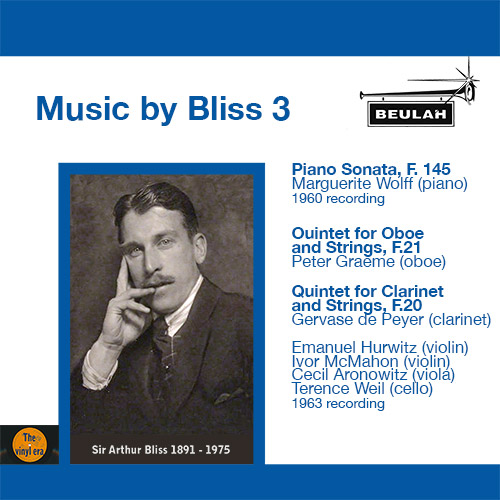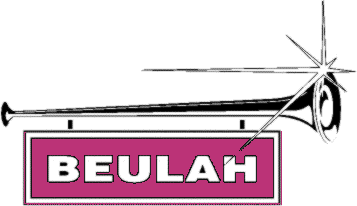|
"The Beulah
record label has always been one of the most idiosyncratic, and
therefore perhaps most interesting, of reissue marques. While the basic
character of Beulah remains the same as in its Compact Disc days, the
range of its present catalogue, driven now by the ease of downloading,
has been extended in remarkable fashion. Browsing the Beulah catalogue
is now rather like being in a 78rpm record shop: there are plenty of
recordings of short pieces available to whet your appetite for either
repertoire or artist, while at the same time there are numerous full
length works available if you wish to consolidate your collection with,
for instance, major symphonies. All of Beulah's transfers, as might be
expected of a distinguished reissue label, are of very high quality."
David Patmore writing in Classical
Recordings Quarterly
|
New for May
Many music lovers miss the sound
from vinyl pressings.
Many others have yet to discover how pleasant the sound can be.
Most of our albums are mastered from vinyl LP pressings and earlier
recordings (before 1953) from 78 rpm discs. It is our ability to
recreate, in the digital age, the sound from the disc era that many of
our customers find most enjoyable.
Unlike modern digital recordings
tracks in our
albums do contain some distortion, and the occasional surface noises,
but for many listeners these "defects" are soon forgotten.
Our albums are available from
many download and
streaming sites.
We highly
recommend downloading from  where you can download or stream in high quality, for
the
same price as iTunes medium quality. where you can download or stream in high quality, for
the
same price as iTunes medium quality.
New album
What the Critics Say
"The music is rarely recorded; I believe these two
accounts emanate from David Josefowitz’s own enterprising Concert Hall
label which, among other things, brought Kurt Equiluz to prominence –
he’s by far the best thing on this reissue. Neither work represents
Beethoven at his best, as he is in the Choral Symphony and Missa
Solemnis, but both are worth having in these forthright performances,
that of Christus am Ölberge at least as good as the Vox
Turnabout from which I got to know the work, also recorded in the early
1960s ."
Brian Wilson at Musicweb
International
"I’m not sure when the Bashford items were recorded,
but the ‘Captain’ offers a clue – the many later recordings were by
Major and Lt.
Colonel Rodney Bashford, so I’m guessing early 1960s. I welcome the
fact that, as with the other items, the emphasis is on the music rather
than its martial character.
"Vivian Dunn made recordings from the early 1940s;
by 1963 when, I believe, this recording was made, he was Lt. Colonel
Sir Vivian Dunn. He was as much a musician as a military man and his
contributions to this release should appeal to lovers of classical
music as much as to collectors of militaria."
Brian Wilson at Musicweb
International
"We were not short of modern recordings of the two
major works, the Piano Concerto and the Downland Suite but the Horsley
recording of the former and the
Foden premiere of the latter are rather special, so I have not
attempted any comparisons.
"The Horsley recording of the concerto is otherwise
available only on a 2-CD Warner download or from a label of doubtful
validity. The recording has transferred well; the original was not of
the best, even for 1957, and I don’t believe it was ever available in
stereo, but it’s all perfectly tolerable. Horsley had long been
associated with the work and he has its measure, with poetry and
showmanship well balanced, as AR’s perceptive Gramophone original
review noted.
"The sonata is of more recent provenance, made by
Saga, though neither it nor The Holy Boy are exactly hi-fi. ...a rare
opportunity to hear Tessa Robbins, one of the greatest violinists of
her time, here very well supported by Alan Rowlands.
"Saga LPs had notoriously bad surfaces but they have
been well tamed here, as have those of the 1932 Downland Suite, which
has come up amazingly well for its age, bright and chipper and still
competitive with Black Dyke (Chandos) and the very few other recordings
of the band version. items, the emphasis is on the music rather
than its martial character."
Brian Wilson at Musicweb
International
|

|
Coming Soon
|
"The Piano Sonata was recorded by Marguerite Wolff,
one of whose specialities was championing the music of Bliss and
Malcolm Williamson, for the obscure Academy label (ACM1). The
performance is idiomatic but I didn’t find myself coming to terms with
the music as much as I had hoped and the recording is rather harsh.
"These recordings of the Quintets, originally
released by EMI subsidiary World Record Club, are otherwise available
only as part of an 11-CD box set of Melos Ensemble recordings (Warner
Icons). Attractive and inexpensive as that is, the Beulah release
offers the recordings in a more manageable format. The performances
were supervised and approved by the composer. The music is more
immediate in appeal, though by no means facile, and the recording has
come up well in the new transfer...these quintets are well worth
getting to know and the Beulah is a good way to do so."
Brian Wilson at Musicweb
International
"Those in search of the Elgar and VW will find this
outstandingly good value. To the contents of the classic 19621
recordings Beulah have added lively accounts of the Sullivan and Arnell
– neither anywhere near the quality of the main works, but not exactly
over-recorded: the only other current account of the Arnell (Dutton) is
of the complete ballet.
"The Beulah transfer of these classic recordings
which
deserve to be preserved for all time is very good. How could I not
award it ‘recommended’ status? Only those averse to the trolley bus on
the cover, now something as classic as these recordings, need say no.
" Each of the four main works is music to die for
and
these de-luxe recordings remain far and away the benchmarks for them.
If you needed proof that the Tallis Fantasia is even more ethereal than
the popular The Lark Ascending, this is it."
Brian Wilson at Musicweb
International
|
